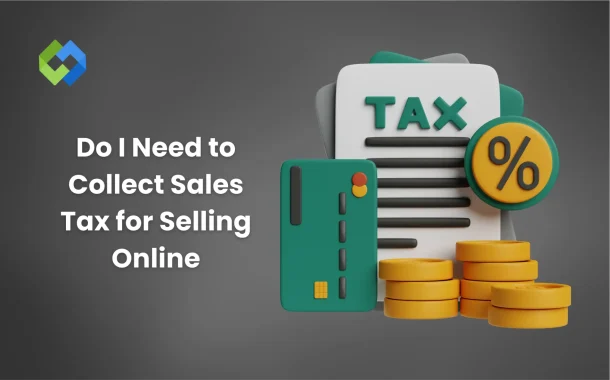Sales tax obligations help you avoid legal trouble and keep your business running smoothly. It also builds trust with your customers, as they see you following the rules. Knowing when and where to collect sales tax ensures you meet your responsibilities, protecting your business from unexpected costs.
Table of Contents
Table of Contents
What is Sales Tax?
Sales tax is a fee added to the sale of most goods and services, charged by the government. It is usually a percentage of the selling price and varies by location. When you buy something, the seller collects this tax from you and sends it to the government. The rate of sales tax can differ between states, counties, or cities, which makes it important to know the rules where you sell or buy.
Sales tax is applied at the point of purchase, meaning the customer pays it as part of the total cost. Not all items are taxed the same way; some goods, like groceries or prescription medications, may be exempt or taxed at a lower rate. Digital products or services can also have different tax rules depending on the region. Sellers need to know which items are taxable and at what rate to charge the correct amount.
Sales tax aims to help governments raise money to fund public services. This includes schools, roads, healthcare, and other essential services. By collecting sales tax, governments can benefit their communities without relying only on income taxes or other forms of revenue. It’s a critical part of how local and state governments function.
Sales Tax Requirements for Online Sellers
Start by identifying if your business has a sales tax nexus in any state. This connection can be established through physical presence, like a store or warehouse, or economic activity, such as reaching a certain amount of sales or transactions.
Register for Sales Tax Permits
Once you identify the states where you have a sales tax nexus, you need to register for a sales tax permit in each of these states. This permit legally allows you to collect sales tax from your customers. Each state has its registration process, which can involve specific forms, fees, and requirements. You must complete this registration before you start collecting sales tax. Failing to obtain a permit can result in fines, interest on unpaid taxes, or other legal consequences, so it is important to handle this step promptly and correctly.
Collect and Calculate the Correct Sales Tax
With your sales tax permits in place, you must start collecting the correct amount of sales tax on all taxable sales. The rate you collect depends on various factors, such as the buyer’s location, the type of product or service sold, and any local or special tax rates that apply. Some states may have different rates within the same state, depending on the city or county. To ensure accuracy, many sellers use a sales tax calculator from Omni Calculator to automate sales tax calculations. Displaying the sales tax on invoices or receipts helps maintain transparency with customers and ensures they understand the charges.
File Sales Tax Returns and Remit Payments
After collecting sales tax, you must file returns and remit the collected taxes to the respective state authorities. The frequency of these filings monthly, quarterly, or annually depends on the state’s requirements and your sales volume. Filing on time is crucial, as late submissions can result in penalties, interest, and audits. Keep detailed records of all sales, taxes collected, and filings to ensure accuracy and compliance. This documentation is essential for resolving any disputes or audits that may arise.
Exemptions and Special Situations
Not all sales are subject to sales tax; some products or services may qualify for exemptions. Common exemptions include essential items like groceries, prescription medications, and certain medical equipment, depending on the state. Some states also exempt sales to non-profit organizations, government agencies, or educational institutions.
Sales Tax on Digital Products and Services
Digital products, like eBooks, music downloads, and online courses, often fall into a gray area when it comes to sales tax. Some states treat digital goods the same way as physical goods and require sales tax to be collected. Other states may have specific rules or exemptions for digital products and services. The rules may also differ for digital subscriptions or software as a service (SaaS). Online sellers need to be aware of these differences to ensure they are collecting the correct sales tax or applying exemptions properly.
Handling International Sales
When selling to customers outside of your home country, sales tax rules can get even more complicated. Many countries have their version of a sales tax, such as Value-Added Tax (VAT) in the European Union or Goods and Services Tax (GST) in countries like Canada and Australia. You may need to register for VAT or GST in these countries if your sales exceed certain thresholds. It’s essential to understand each country’s requirements to determine whether you need to collect and remit tax on international sales.
Special Situations and Tax Holidays
Some states offer special situations like tax holidays, where certain items can be purchased without sales tax for a limited time. For example, states may offer back-to-school tax holidays for items like clothing, school supplies, or computers. If you sell items that qualify for these holidays, you don’t have to collect sales tax during that period. Understanding these special situations can help you offer competitive pricing and comply with state rules, enhancing customer satisfaction and ensuring compliance.
Sales Tax Compliance Tools and Resources
Using Sales Tax Compliance Software
Sales tax compliance software can help online sellers automate the collection, calculation, and reporting of sales tax. These tools track sales tax rates for different states and localities, ensuring you charge the correct amount for every transaction. They can also help with filing returns and remitting payments to state authorities.
Popular tools like Avalara, TaxJar, and Vertex provide features like automated rate updates, reporting, and integration with e-commerce platforms. Using compliance software reduces errors, saves time, and ensures your business meets all sales tax obligations.
Government Resources and Guidelines
Many state and local governments provide resources to help businesses understand their sales tax obligations. These resources include state tax websites, which offer detailed guidelines, forms, and updates on rates and rules. Some states provide online tools to help you determine if you have a nexus, register for permits, and calculate the correct tax rates. Visiting these official websites regularly can help you stay informed about any changes in the law or tax rates that may affect your business.
Consulting with a Tax Professional
For more complex sales tax situations, consulting with a tax professional can be a wise decision. Tax professionals have expertise in state and local tax laws and can provide tailored advice for your specific business needs. They can help you navigate complex tax rules, ensure compliance, and handle any audits or disputes that may arise. Working with a tax advisor is especially useful if you sell in multiple states or countries and need to manage different tax requirements.
Consequences of Not Collecting Sales Tax
Not collecting sales tax when you’re supposed to can lead to hefty penalties and fines. States and local governments take sales tax rules seriously. If you don’t collect or send in the right amount of sales tax, you might face fines that add up quickly. You could also be charged interest on the unpaid taxes. These costs can hurt your business’s bottom line and financial health.
Ignoring sales tax rules can also lead to legal problems and audits. Tax authorities might audit your business to check if you’ve been following the rules. Audits take time and can be expensive to deal with. In serious cases, you could face legal action, which can further damage your business.
Your business’s reputation can suffer if you don’t handle sales tax correctly. Customers may lose trust in your company if they find out you’re not following the law. Negative reviews and bad publicity can turn away potential customers and hurt your brand.
FAQs
Q. Do I need to collect sales tax if I only sell digital products?
It depends on the state. Some states tax digital products, while others do not. Check the rules for each state where you sell.
Q. How do I know if my online store needs to collect sales tax?
You need to check if you have a sales tax nexus in the states where you sell. Nexus can be physical or economic.
Q. What should I do if I accidentally charged the wrong sales tax amount?
Correct the mistake as soon as possible. Notify your customers and adjust the sales tax records. You may need to file an amended return with the tax authority.
Q. Can I get a refund for the sales tax paid on exempt items?
Yes, if you paid sales tax on an item that is exempt, you can usually request a refund from the tax authority. Follow the specific refund process for your state.
Q. Do I need to collect sales tax for sales made to international customers?
Generally, you do not need to collect U.S. sales tax for international sales. However, you may need to comply with the tax rules of the customer’s country, like VAT or GST.
Conclusion
Sales tax requirements is crucial for online sellers. You need to know if you have a sales tax nexus in the states where you do business. This will determine if you must collect sales tax from your customers. Registering for permits, collecting the correct tax amount, and filing returns are essential steps to stay compliant. Using sales tax software and consulting government resources can help manage these tasks.
Ignoring sales tax rules can lead to penalties, legal issues, and damage to your business’s reputation. Make sure to stay informed about sales tax laws and handle them properly to avoid problems. By taking these steps, you ensure your business remains in good standing and operates smoothly.














